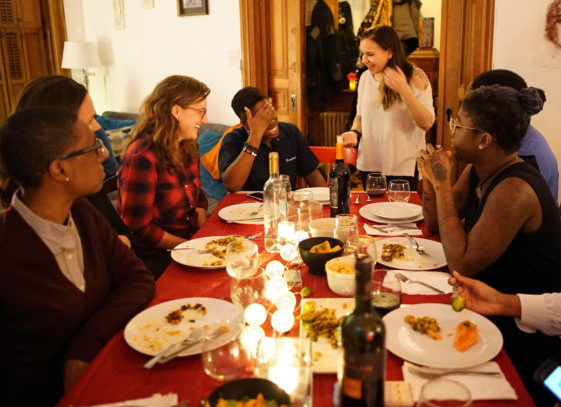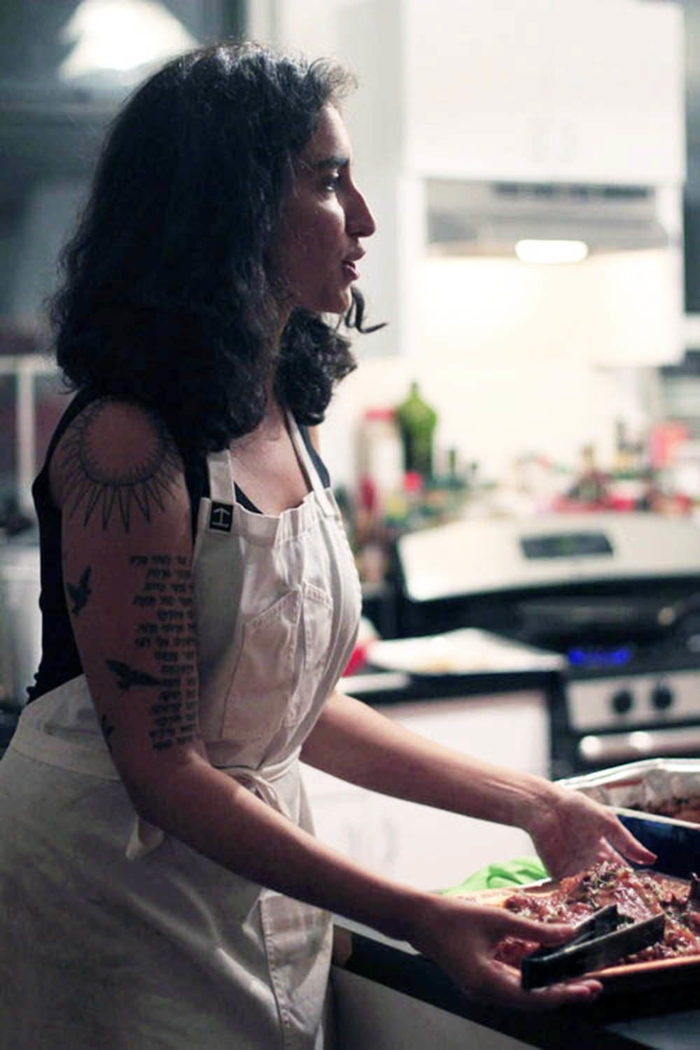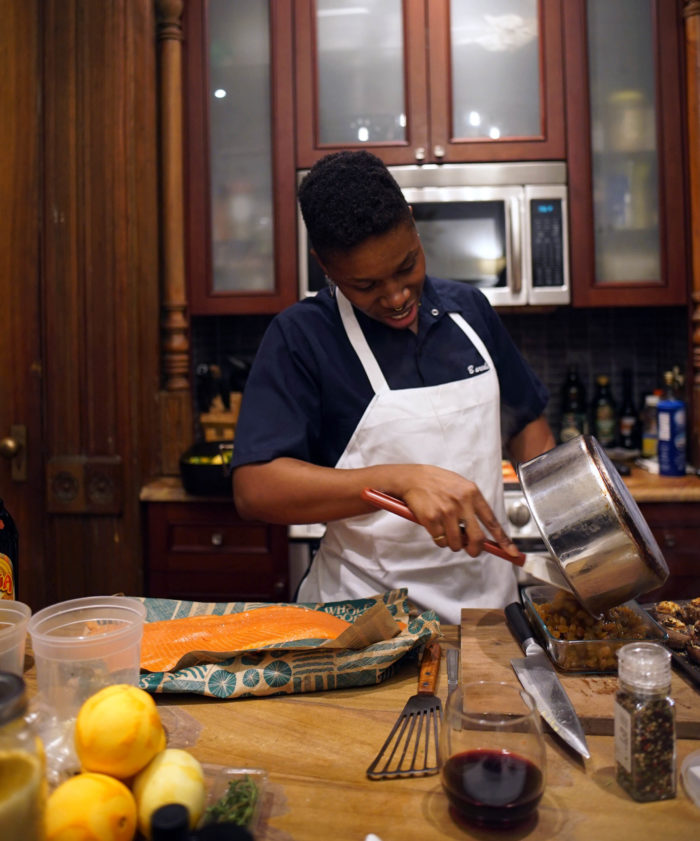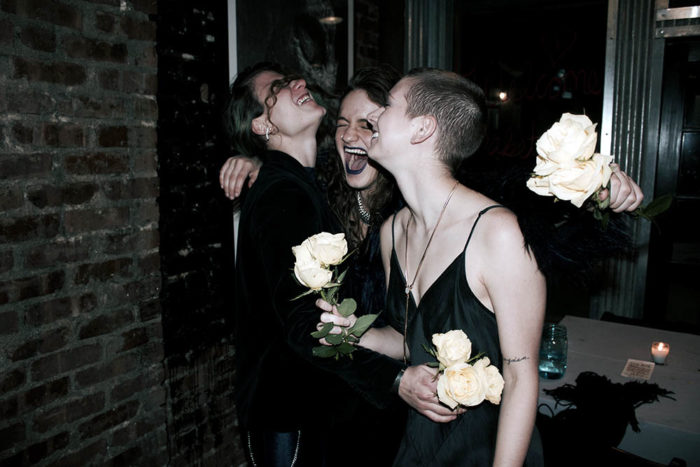At Babetown, a Dinner Party of Their Own
The pop-up 'speakeasy,' launched in Brooklyn, brings together queer women of color–and it's a hit
At a Babetown dinner in February (All photos by Austin McAllister)
On Eastern Parkway tonight, a Passover seder dinner will take place that gladly proclaims itself “pretty historically inaccurate.” The dinner will offer “pretty much none of the things” involved in a traditional seder, though there will be matzoh, Manischewitz wine and “my Mom’s traditional beer braised brisket (the yeast cooks off, it’s fine).” What’s this proudly maverick event? The online invitation sheds light: “Come enjoy an incredibly queer Passover, babes, in the heart of Brooklyn! Don’t be a ‘matzochist’ and miss out!”
As Brooklyn becomes diverse in new ways, the newcomers begin a journey of establishing their own community. Among those new arrivals are technologists, entrepreneurs, and creative people from around the world, of all different kinds. One of the biggest challenges for them is inclusivity. For queer people of color, entrepreneur Alex Koones may have found the answer in the creation of Babetown.

Babetown founder Alex Koones
Babetown is a pop-up speakeasy created to cater specifically to people across the LGBTQIA spectrum (lesbian, gay, bisexual, transsexual, queer, intersex, asexual), with a special embrace for people of color. The monthly dinner party for 30 to 40 people typically costs $35 and sells out quickly. While it started last September in Brooklyn, Babetown now hosts its dinners throughout the city.
Founder Koones, 28, says the new venture has been a convergence of “so many factors” in her life and community. For the Brooklyn native and former chef, “Cooking and entertaining are always nice and a regular occurrence in my life as a way to socialize and connect with those around me. When I left my job as a chef, I had more free time to build my own dinner parties, especially to connect with my own communities in a sober environment,” outside of clubs and other parties.
Her path to Babetown went through the restaurant industry. After graduating from Smith College with a history major, Koones studied culinary arts and went on to work at such notable Manhattan restaurants as The Breslin and Jean Georges, specializing in steakhouse cuisine. Now working for a media company as a conferences coordinator, she formed Be Your Own Babe Inc. as a way to bring her skills together to create an entirely new venue.
Her mission is to make Babetown a relaxed space for marginalized people to celebrate and come together without worry about violence or surveillance. Especially under the Trump Administration, at a time when marginalized groups feel targeted, a space like this is an essential resource for queer people to help reclaim their own power, she believes. Rallies and organized meetings have their place is fostering local activism, but with Babetown, Koones takes a different approach. She has a reputation as the “Queen of Kindness” among friends and family, which aptly describes the movement she wants to start, one of tolerance rather than anger. “Social justice has always been at the forefront of my life,” Koones says. “It’s important that we all go within our own communities and start there to create real change.”

Andrea Anom, the featured chef at February’s Babetown Fancy
Babetown is not a one-woman show. Koones takes the theme of community to heart, bringing in collaborators to help her with integral parts of the operation’s design. Photographer Austin McAllister chronicles each dinner party. Social-media maven Kimberly Drew is a muse and regular attendee. Caitlin Curole often acts as sous chef. Centralizing black women in the project is a way for Koones to give back and bring the community aspect to the forefront. Or as she puts it: “Queer people of color are attracted to the project because so many black women help to make it amazing.”
Next up for Babetown? In May, the venture will host a speed-dating event, in partnership with New Women Space. Why this variation on the dinner party, with cocktails and snacks? “Let’s be real … dating while queer is kind of a struggle. It’s not like you can always wink at that cutie in the coffee shop or buy a drink for that co-worker you kinda know,” says the online invitation. “And online dating is frankly, a time suck, in a city where time is a valuable currency that there is never enough of.”

Babetown celebrants: from left, Caitlin Curole (who served as sous chef), Zena Schulman, and Claire Landsbaum
With the emergence of Babetown, Koones hopes that other marginalized people find inspiration to start their own small businesses. Even amid the rise of the entrepreneurial class in Brooklyn, there’s a need for them to create the kinds of small businesses that focus on the local community. For Koones, this means more businesses led by queer people and people of color: “I hope to see more feminine-positive spaces; queer places that are unapologetically queer.” She cites party organizers Papi Juice and Hot Rabbit as good examples, but her point isn’t limited to nightlife.
“I was hesitant to put myself out there before starting Babetown because I was cautious of criticism,” says Koones. But after finding success, she feels “we should all just put our ideas out there. Most people will respond positively. I talked about doing this for so long, I just wish that I would have started years ago. For anyone wondering, the time to start is now.”










